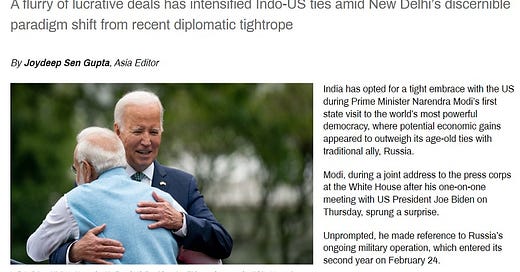Gupta’s innuendo that India is distancing itself from Russia is based solely on his interpretation of: Prime Minister Modi’s motivation in bringing up Ukraine during his trip; Biden’s facial reaction to this; and the deals that those two clinched.
RT’s Asia editor Joydeep Sen Gupta published a piece about Indian Prime Minister Modi’s trip to the US on Thursday about how “Biden embraces Modi as the US intensifies its fight against Russia and China”. The title suggested that India is either colluding with the US in its fight against those two fellow BRICS and SCO countries or has submitted to becoming its proxy in this regard. Gupta’s subtitle further implied that one of these two outcomes occurred as a result of Prime Minister Modi’s visit.
He wrote that “A flurry of lucrative deals has intensified Indo-US ties amid New Delhi’s discernible paradigm shift from recent diplomatic tightrope”, which he then proceeded to argue in his piece. RT’s Asia editor opened up the article by opining that “India has opted for a tight embrace with the US during Prime Minister Narendra Modi’s first state visit to the world’s most powerful democracy, where potential economic gains appeared to outweigh its age-old ties with traditional ally, Russia.”
This was followed by him observing that “Unprompted, he made reference to Russia’s ongoing military operation, which entered its second year on February 24. Modi offered India’s help to resolve the conflict and restore peace, while stopping short of naming Russia as the aggressor. The comment was music to President Biden’s ears, whose usual impassive expression could not contain his uncontrolled glee…And, Russia did not top the agenda until Modi, as if on cue from Biden, spoke about the conflict with Ukraine.”
From Gupta’s perspective, “It was abundantly clear that the US had laid out a red carpet for Modi in a bid to isolate New Delhi from Moscow, with bountiful incentives and path-breaking new partnerships in the defense, semiconductor manufacturing, space and artificial intelligence sectors.” With all due respect to him and his platform, this is a misreading of Indian-US ties and Prime Minister Modi’s envisaged grand strategy, which will now be explained after drawing the reader’s attention to six relevant analyses.
* 2 March: “Towards Tri-Multipolarity: The Golden Billion, The Sino-Russo Entente, & The Global South”
* 1 May: “Foreign Affairs Published An Impressively Insightful Analysis About Indian-US Relations”
* 4 May: “RIC’s Differences Should Be Candidly Acknowledged Instead Of Denied Or Spun By Alt-Media”
* 4 June: “India Is Multi-Aligned But Non-Allied”
* 21 June: “Neither China Nor The US Has Any Influence Over The Russian-Indian Strategic Partnership”
* 22 June: “The US Finally Realized The Futility Of Trying To Force India Into Vassalhood”
In brief, India’s multi-alignment between key players aims to strengthen its strategic autonomy in the New Cold War, which its leadership regards as integral to accelerating its rise as a globally significant Great Power. The US has finally begun to respect this pragmatic approach after months of its liberal-globalist policymaking faction pressuring India to dump Russia and go to war against China. Unlike what Gupta wrote, Minister Modi’s latest trip to the US actually confirmed the accuracy of this assessment.
His peace remark was purely neutral by not blaming any party to the NATO-Russian proxy war in Ukraine and came at the moment that the Kremlin strongly suggested its interest in freezing this conflict if certain security conditions are met. The reader can learn more about the military-strategic context in which Prime Minister Modi implied India’s intent in mediating a political resolution to that proxy war here and here since the details are beyond the scope of this analysis.
The point is that his words were consistent with his country’s multi-alignment policy and in no way represented a “discernable paradigm shift” like Gupta claimed. Prime Minister Modi once again defied US pressure to blame Russia for this conflict and bravely did so while speaking next to Biden, which proves that India still remains neutral amidst its top two strategic partners’ ongoing proxy war. If anything, his peace remark advances President Putin’s newly implied goal of freezing this conflict.
This insight discredits Gupta’s innuendo that India is distancing itself from Russia, the conclusion of which was based solely on his interpretation of: Prime Minister Modi’s motivation in bringing up Ukraine; Biden’s facial reaction to this; and the deals that those two clinched. If a “discernable paradigm shift” had truly occurred, then the Indian leader would have explicitly condemned Russia and then jumped on the US’ sanctions bandwagon, but neither happened so there’s nothing to worry about.





"...so there’s nothing to worry about."
Oh, there's plenty to worry about.